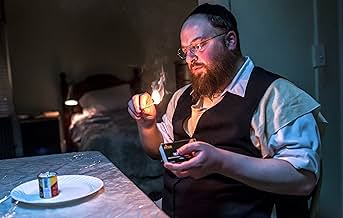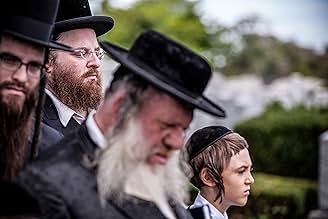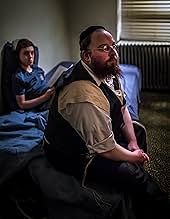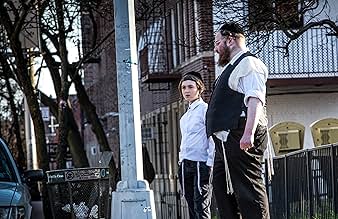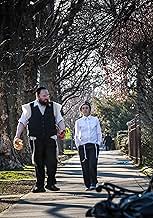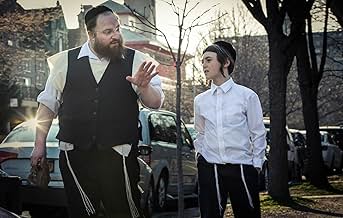CALIFICACIÓN DE IMDb
6.6/10
2.7 k
TU CALIFICACIÓN
Agrega una trama en tu idiomaWithin Brooklyn's ultra-orthodox Jewish community, a widower battles for custody of his son. A tender drama performed entirely in Yiddish, the film intimately explores the nature of faith an... Leer todoWithin Brooklyn's ultra-orthodox Jewish community, a widower battles for custody of his son. A tender drama performed entirely in Yiddish, the film intimately explores the nature of faith and the price of parenthood.Within Brooklyn's ultra-orthodox Jewish community, a widower battles for custody of his son. A tender drama performed entirely in Yiddish, the film intimately explores the nature of faith and the price of parenthood.
- Dirección
- Guionistas
- Elenco
- Premios
- 7 premios ganados y 18 nominaciones en total
Meir Ber Schwartz
- The Ruv
- (as Meyer Schwartz)
Melissa Weisz
- Bayla
- (voz)
Opiniones destacadas
This particular genre is a bit like found footage horror: a lot of new film makers see it as an easy and affordable way of getting their foot in the door.
A restrained but curiously authentic feeling story that is not itself about Menashe getting remarried (as it is often advertized) but more about him dealing with the pressure to do so. There is something horribly feasible in the premise and the writing is naturalistic without ever becoming drab or dull. This is a story you can believe is happening right now in little communities all over the world and it tells this story without sensationalism or soap opera heaviness.
The narrative is fragmented into episodes of Menashe having fun with his son, doing his job and Jewish stuff. It's a serene and rather charming vision into the life of someone is really just a regular guy, he happens to just be part of a particular community he has no desire to subvert or part from, yet find himself victim to the values he has implicitly accepted.
The film is at its most charming when Menashe is with his son. The details of this brand of Judaism which Menashe tries uphold and pass down to him really make the movie memorable and touching while those very same values strive to keep them apart.
This will not be everyone's cup of tea: although nothing transgressive it will simply be too leisurely and uneventful for many people and this is indeed a movie where you just have to feel the moment: the prayers at a cemetery, picking a painting of a Rabbi etc. You may easily find it hard to stay awake or watch this in one sitting. But for what it is, it is pretty much note perfect and leaves you with a powerful sense of the quite desperation and helplessness that so many of us just have to live with.
There is a moment where I was holding my breath, you'll know it when you see it...
A restrained but curiously authentic feeling story that is not itself about Menashe getting remarried (as it is often advertized) but more about him dealing with the pressure to do so. There is something horribly feasible in the premise and the writing is naturalistic without ever becoming drab or dull. This is a story you can believe is happening right now in little communities all over the world and it tells this story without sensationalism or soap opera heaviness.
The narrative is fragmented into episodes of Menashe having fun with his son, doing his job and Jewish stuff. It's a serene and rather charming vision into the life of someone is really just a regular guy, he happens to just be part of a particular community he has no desire to subvert or part from, yet find himself victim to the values he has implicitly accepted.
The film is at its most charming when Menashe is with his son. The details of this brand of Judaism which Menashe tries uphold and pass down to him really make the movie memorable and touching while those very same values strive to keep them apart.
This will not be everyone's cup of tea: although nothing transgressive it will simply be too leisurely and uneventful for many people and this is indeed a movie where you just have to feel the moment: the prayers at a cemetery, picking a painting of a Rabbi etc. You may easily find it hard to stay awake or watch this in one sitting. But for what it is, it is pretty much note perfect and leaves you with a powerful sense of the quite desperation and helplessness that so many of us just have to live with.
There is a moment where I was holding my breath, you'll know it when you see it...
Really like the film.
I'm hoping that I got a pretty actuate perceptive on the Hasidic Jewish community. I'm aware of some aspects about how women are treated as a whole, which for me, made it more interesting that the movie tells a story about a widowed father trying to raise his son in a society that says he can't do it.You don't see that enough in movies in general. A man doing what he has to to be a man in order to raise his child alone, and I'm seeing it in the most rarest prospective.
It reminds me of Moonlight, it's not really a story I've never herd before but nobody tells the story from this unique angel.
Brilliant! http://cinemagardens.com
I'm hoping that I got a pretty actuate perceptive on the Hasidic Jewish community. I'm aware of some aspects about how women are treated as a whole, which for me, made it more interesting that the movie tells a story about a widowed father trying to raise his son in a society that says he can't do it.You don't see that enough in movies in general. A man doing what he has to to be a man in order to raise his child alone, and I'm seeing it in the most rarest prospective.
It reminds me of Moonlight, it's not really a story I've never herd before but nobody tells the story from this unique angel.
Brilliant! http://cinemagardens.com
Struggle is something that is universal. Adversity doesn't care who you are, where you have come from, or even who you know. Granted, it can be relative, but no matter who you are, road blocks are still road blocks. Documentarian and first-time narrative director Joshua Z. Weinstein takes this theme but looks at it from a different direction with "Menashe," featured at this year's Dallas International Film Festival and now getting a wider release.
The title character is played by Menashe Lustig and is a widower who is just trying to get by in his ultra-orthodox Jewish community. He is still mourning the loss of his wife a year later while constantly chasing his bills working at a local Jewish market, and he is also dealing with the fact that he does not have custody of his son, Rieven (Ruben Nidorski) due to his religious beliefs that children must be raised in a two-parent household. Until he remarries, Rieven has to live with his brother, Eizik (Yoel Weisshaus), and his family. Menashe has always been seen as the lesser of his siblings, so he embarks on a journey of self-discovery and responsibility just to try for a normal life.
Weinstein takes his documentary-style of filming (with no score and a lot of steady-cam shots) and applies it here, which gives it an intimate feel that really enhanced my emotional investment into his story (which he also co-wrote with Alex Lipschultz). In my comments to our vendor after the screening, I used the phrase "both heartbreaking and heartwarming," and this is the best way I can describe "Menashe". Lustig plays the lead character in a way that even though his struggles are specific to a demographic, there are themes of independence, responsibility, and family that each and every one of us can identify with and feel for him during. His work with Nidorski is very organic, and it works on every level. Almost the entire film is translated from Yiddish, but as real and powerful as this story is, the subtitling bothered me even less than it normally does.
It is true that this film may not be seen as "for everyone" due to the community that it takes place in, but I fully and whole-heartedly disagree. Its universal themes are presented in a way that its context is well-explained so that the audience can see why the traditions are what they are. Much like "Donovan" earlier this year, "Menashe" is an independent film that tells its story in an honest and grounded way that deserves to be seen by as large of an audience as possible.
The title character is played by Menashe Lustig and is a widower who is just trying to get by in his ultra-orthodox Jewish community. He is still mourning the loss of his wife a year later while constantly chasing his bills working at a local Jewish market, and he is also dealing with the fact that he does not have custody of his son, Rieven (Ruben Nidorski) due to his religious beliefs that children must be raised in a two-parent household. Until he remarries, Rieven has to live with his brother, Eizik (Yoel Weisshaus), and his family. Menashe has always been seen as the lesser of his siblings, so he embarks on a journey of self-discovery and responsibility just to try for a normal life.
Weinstein takes his documentary-style of filming (with no score and a lot of steady-cam shots) and applies it here, which gives it an intimate feel that really enhanced my emotional investment into his story (which he also co-wrote with Alex Lipschultz). In my comments to our vendor after the screening, I used the phrase "both heartbreaking and heartwarming," and this is the best way I can describe "Menashe". Lustig plays the lead character in a way that even though his struggles are specific to a demographic, there are themes of independence, responsibility, and family that each and every one of us can identify with and feel for him during. His work with Nidorski is very organic, and it works on every level. Almost the entire film is translated from Yiddish, but as real and powerful as this story is, the subtitling bothered me even less than it normally does.
It is true that this film may not be seen as "for everyone" due to the community that it takes place in, but I fully and whole-heartedly disagree. Its universal themes are presented in a way that its context is well-explained so that the audience can see why the traditions are what they are. Much like "Donovan" earlier this year, "Menashe" is an independent film that tells its story in an honest and grounded way that deserves to be seen by as large of an audience as possible.
The Hasidic tradition that a child must be raised in a household where there is both a mother and a father is one of the cultural issues brought to the fore in Joshua Weinstein's bittersweet film Menashe. Co-written by Alex Lipschutz and Musa Syeed ("A Stray") and set in the Hasidic community in the Borough Park section of Brooklyn using all non-professional actors, Menashe is an engaging character study that provides rare insight into a society largely hidden from the outside world and a father's endearing love for his son and the challenges he faces strike a universal chord.
Spoken almost entirely in Yiddish, Menashe (Menashe Lustig) is a widower who wants to live his own life and raise his young son Rieven (Ruben Niborski) by himself. Unfortunately, the ultra-Orthodox community of which he is a part does not see it that way. In his opposition to Hasidic cultural norms, he risks his son's expulsion from school and jeopardizes his status in the community. Menashe wants to do right by his son, but the Talmud says that a man needs three things: a nice wife, a house and dishes (presumably no paper plates). Without a wife Menashe has to allow Rieven's gruff and super critical uncle Eizik (Yoel Weisshaus) to raise the boy. The burly, sloppy-looking Menashe fancies himself as a rebel, refusing to wear a hat and jacket required by Hasidic custom, but he is a rebel without a cause.
Weinstein, however, does not stand in judgment of his main character and tells his story in a straightforward, if not entirely sympathetic manner, but it is a hard sell. Menashe's job stocking shelves at a local market is barely enough to make a living and his ineptness draws the ire of his boss when one thousand dollars worth of gefilte fish falls out of the van he is driving. In addition, the small unkempt one-room apartment is a dubious environment to raise a child. Menashe feeds his son junk food and sodas for breakfast, but the boy, though critical of the way he treated his mother, still loves him.
The stakes are high but Menashe refuses to remarry, telling friends that his previous arranged marriage with an Israeli woman was filled with constant conflict and unhappiness and tells a beggar to avoid marriage because "it's better for your health." He goes on a date with a widowed mother with children who is not reticent about telling him what a fine husband he would make. When Menashe shows his reluctance to enter into a marriage of convenience, however, she condemns Hasidic men, saying that "First your mothers spoil you, then your wives." Menashe appeals to the rabbi (Meyer Schwartz) but he is unyielding. Eventually he takes pity and offers a compromise: Rieven can stay with Menashe for one month, but if he hasn't remarried after the anniversary of his mother's death, the boy must return to Eizik.
Desperate to prove himself to be a worthy father, Menashe asks the rabbi if he can host a memorial for his deceased wife in his small apartment. Reluctantly all agree that "even a bear can learn to dance." Menashe raises complex issues about the conflict between social acceptance, religious dogma, and human needs and desires. Unfortunately, the film's running time of eighty-two minutes seems inadequate to explore the complex issues the film raises. Weinstein, however, does not want to go there. He said, "I was interested more in the non-plot elements than the plot of the film. It was about the texture, the anecdotes, faces, moments." These poignant faces and moments are what we cannot forget.
Spoken almost entirely in Yiddish, Menashe (Menashe Lustig) is a widower who wants to live his own life and raise his young son Rieven (Ruben Niborski) by himself. Unfortunately, the ultra-Orthodox community of which he is a part does not see it that way. In his opposition to Hasidic cultural norms, he risks his son's expulsion from school and jeopardizes his status in the community. Menashe wants to do right by his son, but the Talmud says that a man needs three things: a nice wife, a house and dishes (presumably no paper plates). Without a wife Menashe has to allow Rieven's gruff and super critical uncle Eizik (Yoel Weisshaus) to raise the boy. The burly, sloppy-looking Menashe fancies himself as a rebel, refusing to wear a hat and jacket required by Hasidic custom, but he is a rebel without a cause.
Weinstein, however, does not stand in judgment of his main character and tells his story in a straightforward, if not entirely sympathetic manner, but it is a hard sell. Menashe's job stocking shelves at a local market is barely enough to make a living and his ineptness draws the ire of his boss when one thousand dollars worth of gefilte fish falls out of the van he is driving. In addition, the small unkempt one-room apartment is a dubious environment to raise a child. Menashe feeds his son junk food and sodas for breakfast, but the boy, though critical of the way he treated his mother, still loves him.
The stakes are high but Menashe refuses to remarry, telling friends that his previous arranged marriage with an Israeli woman was filled with constant conflict and unhappiness and tells a beggar to avoid marriage because "it's better for your health." He goes on a date with a widowed mother with children who is not reticent about telling him what a fine husband he would make. When Menashe shows his reluctance to enter into a marriage of convenience, however, she condemns Hasidic men, saying that "First your mothers spoil you, then your wives." Menashe appeals to the rabbi (Meyer Schwartz) but he is unyielding. Eventually he takes pity and offers a compromise: Rieven can stay with Menashe for one month, but if he hasn't remarried after the anniversary of his mother's death, the boy must return to Eizik.
Desperate to prove himself to be a worthy father, Menashe asks the rabbi if he can host a memorial for his deceased wife in his small apartment. Reluctantly all agree that "even a bear can learn to dance." Menashe raises complex issues about the conflict between social acceptance, religious dogma, and human needs and desires. Unfortunately, the film's running time of eighty-two minutes seems inadequate to explore the complex issues the film raises. Weinstein, however, does not want to go there. He said, "I was interested more in the non-plot elements than the plot of the film. It was about the texture, the anecdotes, faces, moments." These poignant faces and moments are what we cannot forget.
This movie causes tremendous anguish, okay Menashe can't be considered what we usually call a responsible adult, but the rules on fatherhood revolted me extremely, it hurt, to see the love for the child and the mandatory absence (no father and mother a child can't study) absurd... Slow, delicate, simple, a pure portrait of father/son love and Jewish traditions. Menashe's plot is loosely based on Lustig's life. In an interview with the Los Angeles Times, he said that "unlike Menashe in the movie, I'm not a schlimazel by nature. Maybe just a schlimazel by situation."
¿Sabías que…?
- TriviaDirector Joshua Z Weinstein, who is neither a member of a Haredi community nor a speaker of Yiddish, used a translator on set.
- Bandas sonorasIvdu Es Hashem Mit Simcha
Written and performed by Michoel Schnitzler
Courtesy of Michoel Schnitzler
Selecciones populares
Inicia sesión para calificar y agrega a la lista de videos para obtener recomendaciones personalizadas
- How long is Menashe?Con tecnología de Alexa
Detalles
- Fecha de lanzamiento
- Países de origen
- Sitio oficial
- Idiomas
- También se conoce como
- 我和我的不完美老爸
- Locaciones de filmación
- Productoras
- Ver más créditos de la compañía en IMDbPro
Taquilla
- Total en EE. UU. y Canadá
- USD 1,703,036
- Fin de semana de estreno en EE. UU. y Canadá
- USD 62,078
- 30 jul 2017
- Total a nivel mundial
- USD 1,962,265
- Tiempo de ejecución1 hora 22 minutos
- Color
- Mezcla de sonido
- Relación de aspecto
- 2.00 : 1
Contribuir a esta página
Sugiere una edición o agrega el contenido que falta




